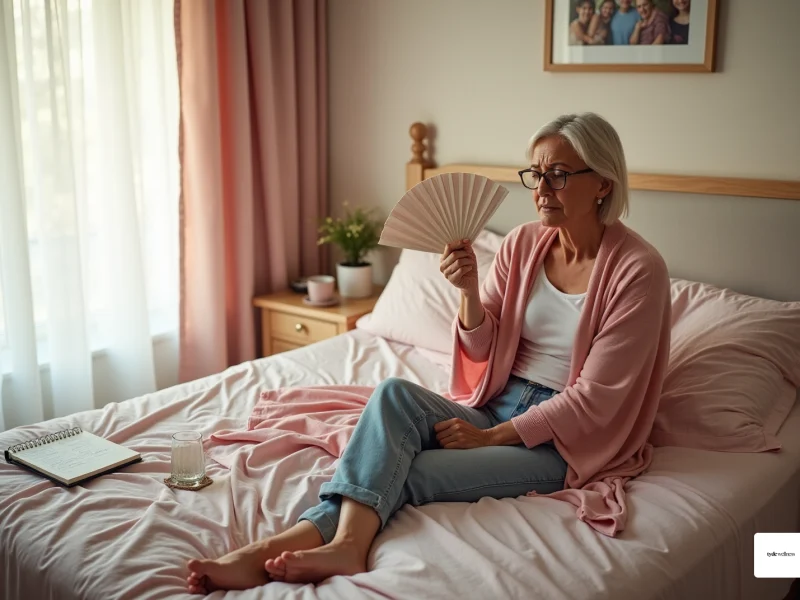Overview
This article examines the relationship between hot flashes and anxiety in menopausal women, underscoring how hormonal changes can intensify both issues. It highlights that the interaction between hot flashes and anxiety establishes a feedback loop, complicating management efforts. As a result, it is essential to implement integrated treatment strategies that consider both physical and mental health aspects, ultimately enhancing overall well-being.
Introduction
Understanding the intricate relationship between hot flashes and anxiety is crucial for women’s health, particularly during the menopausal transition. Hormonal fluctuations can trigger intense physical sensations that simultaneously heighten feelings of unease. This creates a challenging cycle that affects overall well-being.
What strategies can women employ to navigate this dual challenge effectively? Recognizing the interplay between these two conditions can lead to better management and improved quality of life.
Define Hot Flashes and Anxiety: Key Concepts and Relevance
Hot flashes are sudden sensations of intense heat, often accompanied by sweating and flushing, primarily affecting the upper body. Approximately 75% of women experience these symptoms during menopause, which result from hormonal fluctuations, particularly a decrease in estrogen levels. In contrast, anxiety is characterized by discomfort, fear, and apprehension, manifesting physically through signs such as elevated heart rate and perspiration. Both conditions are interconnected, especially in the context of menopause, where hormonal changes can exacerbate hot flashes anxiety.
Research indicates a significant correlation between hot flashes and feelings of unease in menopausal women. For instance, a 2021 study found that women experiencing more severe nighttime hot flashes reported increased levels of distress. This relationship is particularly concerning, as stress can activate the body’s stress response, releasing cortisol, which may further disrupt hormonal balance and worsen menopausal symptoms. Furthermore, more than 45% of women report mood fluctuations during menopause, with many encountering heightened stress for the first time.
Understanding the is essential for addressing women’s health during this transitional phase. Recent studies underscore the necessity for comprehensive care that considers both the physical and mental aspects of menopause, as these manifestations often interconnect, creating a cycle that can significantly impact overall wellness.
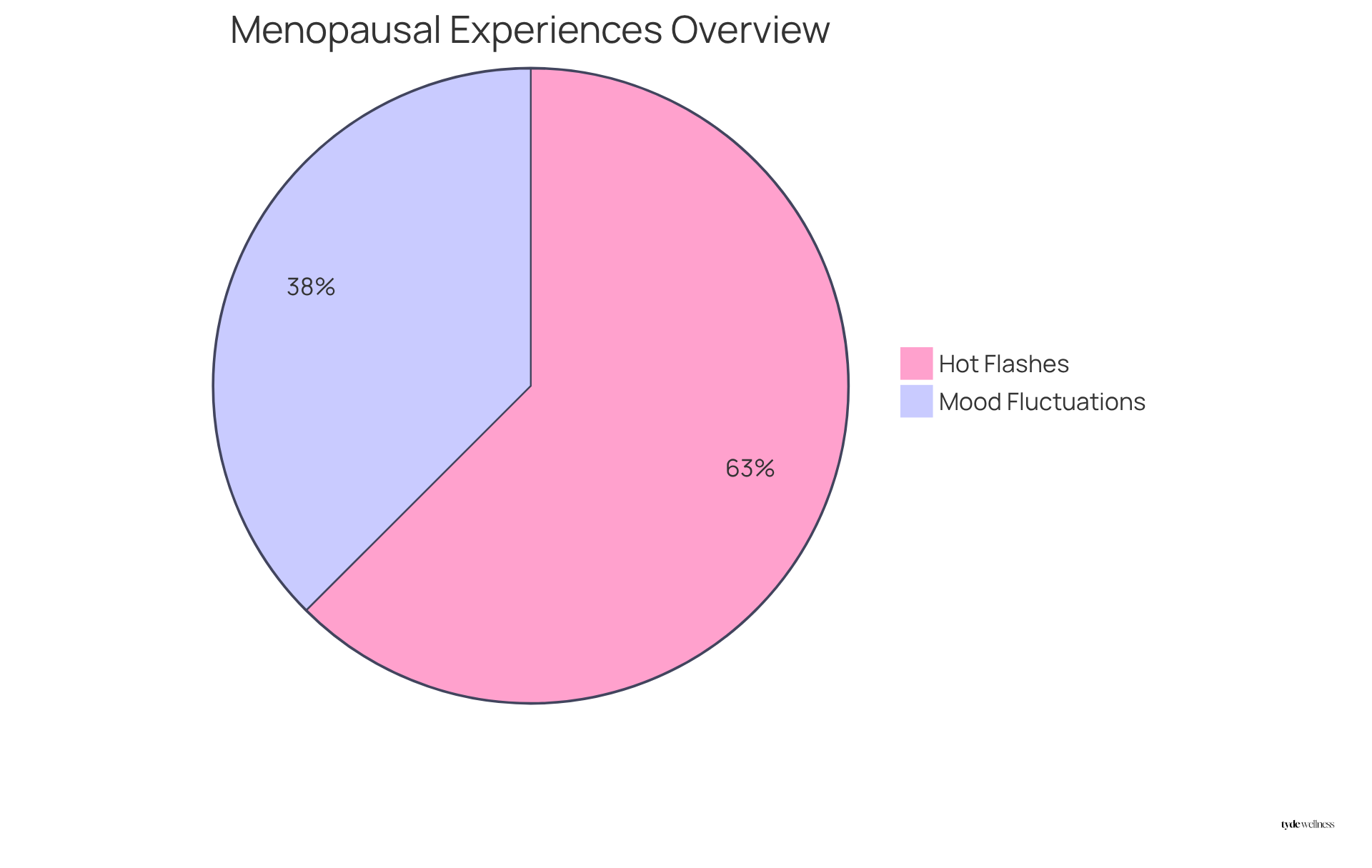
Explore Symptoms and Triggers: How Hot Flashes and Anxiety Manifest
Hot flashes are characterized by sudden sensations of warmth that typically begin in the chest and radiate to the neck and face, often accompanied by sweating and chills. These episodes can be triggered by various factors, including:
- Stress
- Spicy foods
- Caffeine
- Warm environments
Anxiety indicators, on the other hand, may manifest as:
- Restlessness
- Rapid heartbeat
- Sweating
- Feelings of impending doom
Common triggers for nervousness include:
- Stressful life events
- Health concerns
- Hormonal fluctuations
Understanding the connection between these signs is crucial; can be triggered by worry, and the discomfort of can intensify feelings of anxiety. This cyclical relationship complicates management strategies, highlighting the importance for women to recognize and address both conditions simultaneously.
Studies show that women in menopause experience intense heat sensations, and these hot flashes anxiety often accompany the symptoms for an average of 7 to 10 years. Significantly, research indicates that women with bodily tension are at a higher risk for encountering sudden warmth, emphasizing the necessity for comprehensive care that considers both emotional and physical well-being during this transitional period.
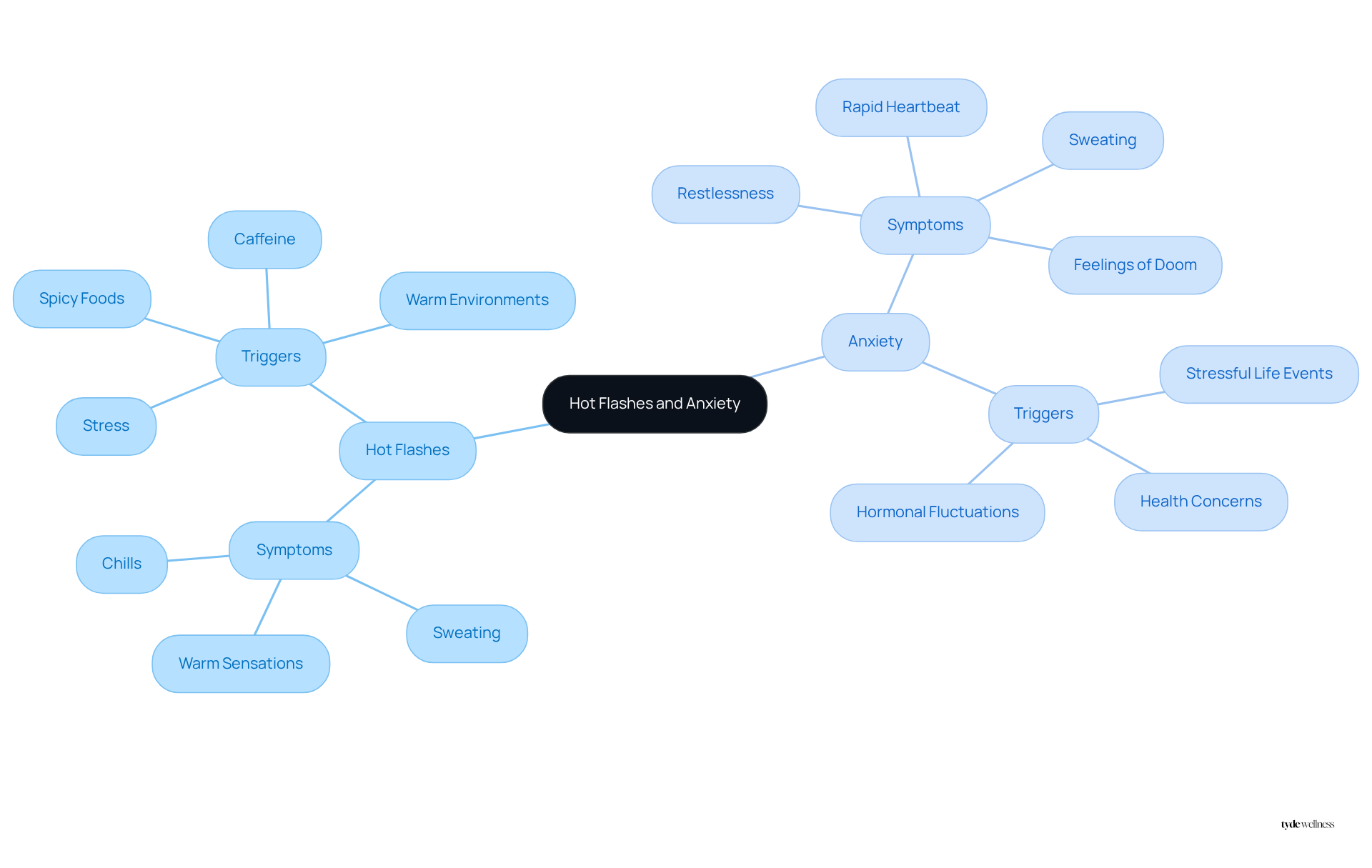
Analyze the Connection: How Hot Flashes and Anxiety Interact
Studies indicate a significant link between feelings of unease and hot flashes anxiety, particularly among menopausal women. The physiological response to stress can trigger sensations of heat due to the activation of the sympathetic nervous system, which increases heart rate and body temperature. Conversely, the discomfort associated with hot flashes anxiety can elevate stress levels, creating a feedback loop that exacerbates both conditions.
Research has demonstrated that women experiencing higher levels of anxiety related to hot flashes are more likely to report frequent and intense heat sensations. This relationship underscores the importance of addressing both hot flashes anxiety and other related issues in , as managing one may alleviate the other.
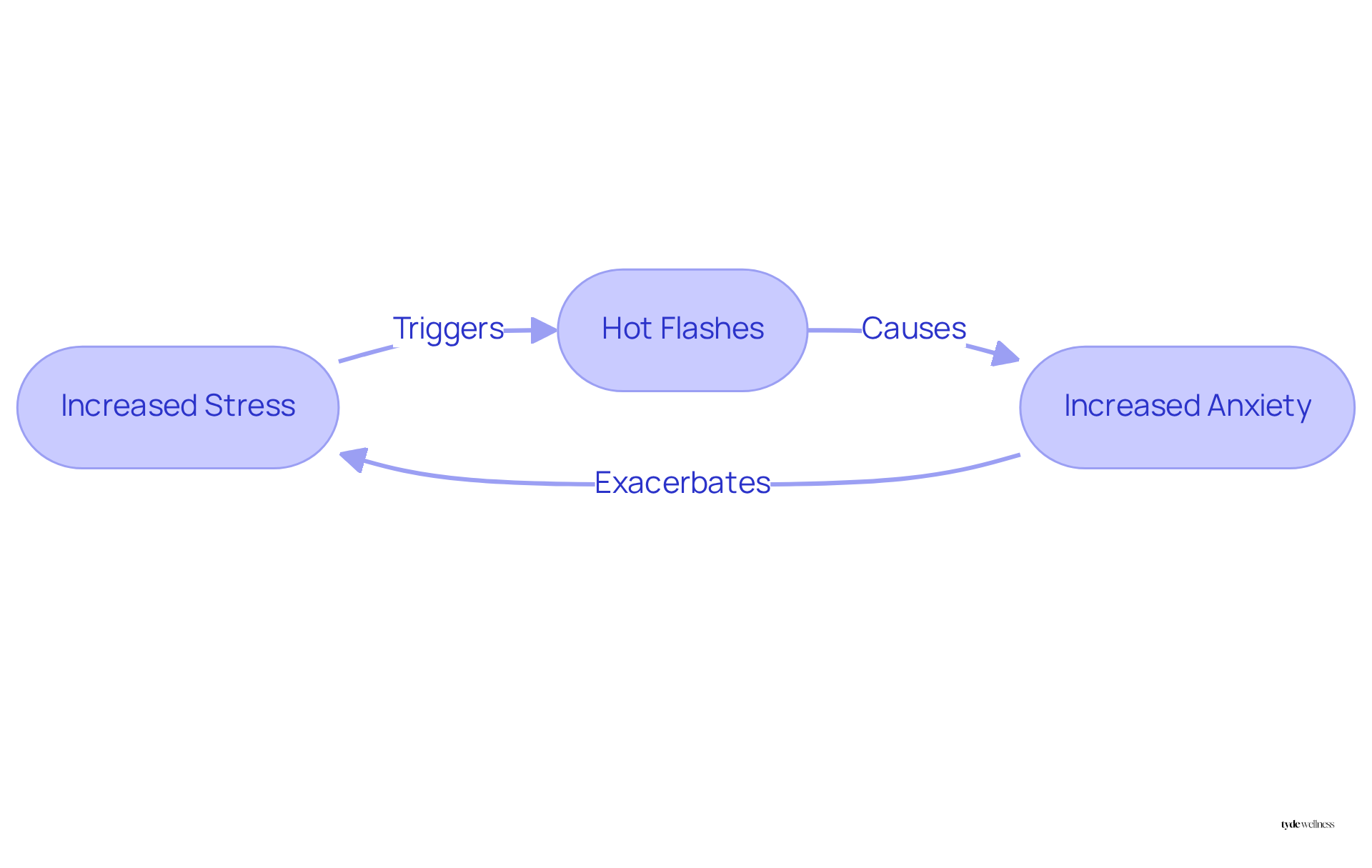
Compare Treatment Options: Managing Hot Flashes and Anxiety
Managing hot episodes often involves hormone replacement therapy (HRT), which has been shown to significantly decrease both the frequency and intensity of symptoms. Research indicates that HRT can reduce hot sensations for many women and may if initiated within ten years of menopause.
Furthermore, non-hormonal alternatives are available, including:
- Selective serotonin reuptake inhibitors (SSRIs)
- Gabapentin
- Lifestyle modifications such as dietary changes and stress management techniques
For those experiencing apprehension, treatment options typically include psychotherapy, particularly cognitive behavioral therapy (CBT), alongside medications such as SSRIs or benzodiazepines. Integrating treatments for both hot flashes and anxiety can yield beneficial outcomes; mindfulness practices and relaxation techniques not only help reduce anxiety but may also alleviate hot flashes.
A comprehensive strategy that addresses both symptoms is crucial for enhancing overall quality of life during menopause. Nearly 60% of women report cognitive issues such as brain fog during this transition, and about 45-60% experience depression. By considering both hormonal and non-hormonal options—including the new non-hormonal medication fezolinetant—women can tailor their treatment plans to effectively manage their symptoms and improve their well-being.
Additionally, while HRT can be effective, it is essential to discuss potential risks, such as increased stroke risk, with a healthcare provider.
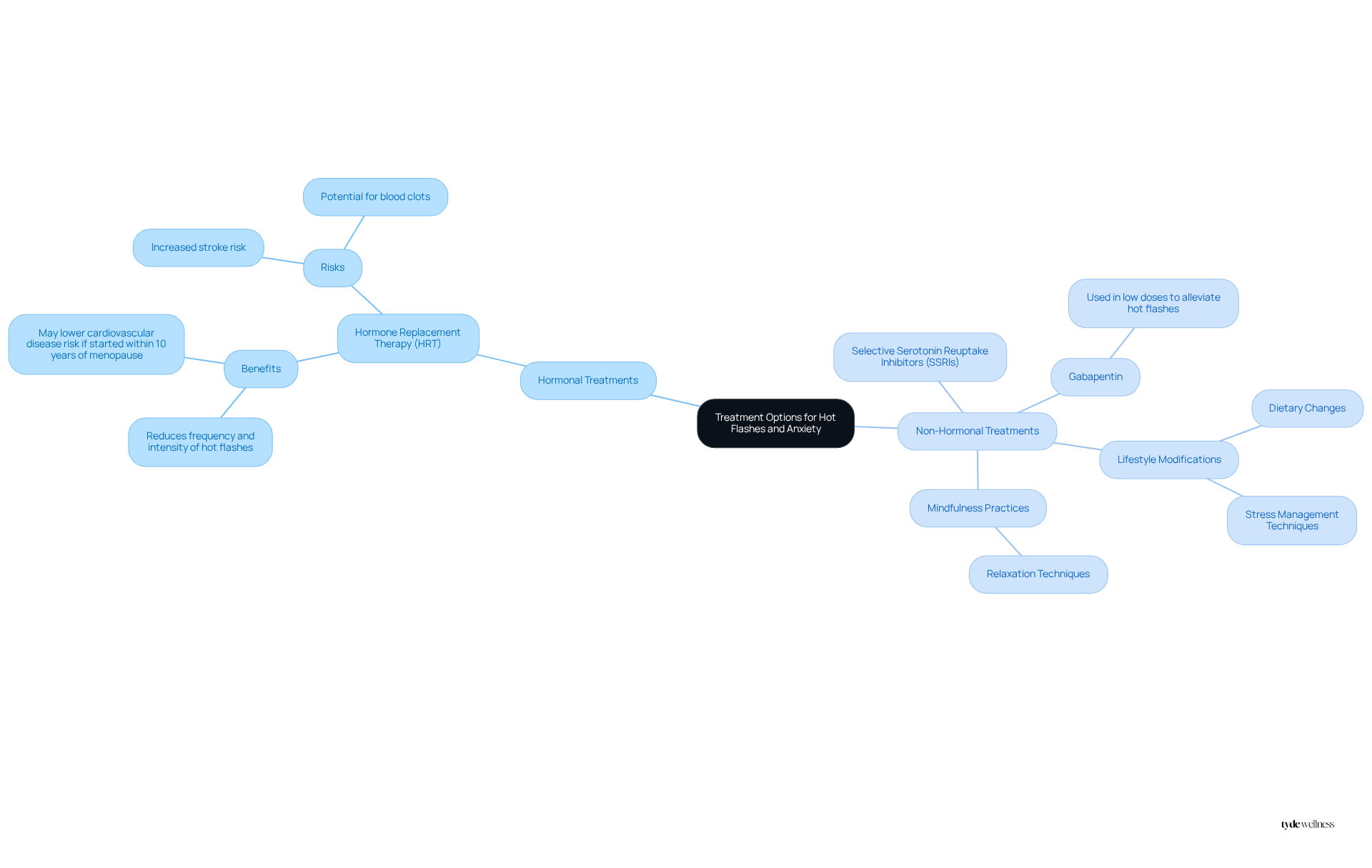
Conclusion
Understanding the intricate relationship between hot flashes and anxiety is crucial for women navigating the menopausal transition. Both conditions, while distinct, often intertwine in a way that can significantly impact a woman’s quality of life. As hormonal fluctuations trigger hot flashes, they can simultaneously heighten feelings of anxiety, creating a challenging cycle that requires thoughtful management.
Recent research reveals that many women experience heightened levels of distress due to the physical discomfort of hot flashes, which is further exacerbated by anxiety. Factors such as stress, dietary choices, and environmental conditions can trigger both hot flashes and anxiety symptoms, emphasizing the importance of recognizing their interconnected nature. Treatment options, including hormone replacement therapy and non-hormonal alternatives, as well as therapeutic approaches for anxiety, highlight the necessity of a comprehensive care strategy that addresses both issues simultaneously.
Ultimately, acknowledging and addressing the dual challenges of hot flashes and anxiety is essential for enhancing women’s health during menopause. By seeking informed treatment options and support, women can take proactive steps toward improving their overall well-being, fostering resilience during this significant life transition.
Frequently Asked Questions
What are hot flashes?
Hot flashes are sudden sensations of intense heat, often accompanied by sweating and flushing, primarily affecting the upper body. They are commonly experienced by women during menopause due to hormonal fluctuations, particularly a decrease in estrogen levels.
What is anxiety in the context of menopause?
Anxiety is characterized by discomfort, fear, and apprehension, which can manifest physically through signs such as an elevated heart rate and perspiration. It is often experienced by women undergoing menopause, especially when coupled with the symptoms of hot flashes.
How are hot flashes and anxiety related?
Hot flashes and anxiety are interconnected, particularly during menopause. Hormonal changes can exacerbate feelings of anxiety, and research indicates that women experiencing hot flashes may report higher levels of distress, creating a cycle that impacts overall wellness.
What recent research findings highlight the connection between hot flashes and anxiety?
A 2021 study found that women experiencing more severe nighttime hot flashes reported increased levels of distress. This suggests a significant correlation between the severity of hot flashes and feelings of unease in menopausal women.
What impact does stress have on menopausal symptoms?
Stress can activate the body’s stress response, releasing cortisol, which may disrupt hormonal balance and worsen menopausal symptoms, including hot flashes and anxiety.
How prevalent are mood fluctuations during menopause?
More than 45% of women report experiencing mood fluctuations during menopause, with many encountering heightened stress for the first time.
Why is it important to understand hot flashes anxiety in women’s health?
Understanding the implications of hot flashes anxiety is essential for addressing women’s health during menopause. Comprehensive care that considers both the physical and mental aspects of menopause is necessary, as these manifestations often interconnect and significantly impact overall wellness.
List of Sources
- Define Hot Flashes and Anxiety: Key Concepts and Relevance
- More Than Just Hot Flashes: Other Menopause Symptoms Can Also Impact Your Quality of Life (https://nyulangone.org/news/more-just-hot-flashes-other-Menopause-symptoms-can-also-impact-your-quality-life)
- Not just hot flashes: The hidden depression crisis in early menopause (https://sciencedaily.com/releases/2025/07/250717013903.htm)
- Hot Flashes and Anxiety: Are They Connected? (https://joinmidi.com/post/hot-flashes-and-anxiety)
- UVA Study Reveals Women Suffer Menopause Symptoms Decades Early (https://news.virginia.edu/content/uva-study-reveals-women-suffer-menopause-symptoms-decades-early)
- Hot Flashes, Anxiety and Menopause: What’s the Connection? (https://health.clevelandclinic.org/hot-flashes-anxiety)
- Explore Symptoms and Triggers: How Hot Flashes and Anxiety Manifest
- Hot Flashes and Anxiety: Are They Connected? (https://joinmidi.com/post/hot-flashes-and-anxiety)
- Anxiety and hot flashes: Link, causes, and how to cope (https://medicalnewstoday.com/articles/anxiety-hot-flashes)
- Hot Flashes, Anxiety and Menopause: What’s the Connection? (https://health.clevelandclinic.org/hot-flashes-anxiety)
- Analyze the Connection: How Hot Flashes and Anxiety Interact
- Hot Flashes, Anxiety and Menopause: What’s the Connection? (https://health.clevelandclinic.org/hot-flashes-anxiety)
- Elektra Health | Anxiety (https://elektrahealth.com/symptoms/anxiety)
- Anxiety and hot flashes: Link, causes, and how to cope (https://medicalnewstoday.com/articles/anxiety-hot-flashes)
- Can Anxiety Cause Hot Flashes in Menopause? (https://honehealth.com/edge/anxiety-hot-flashes-menopause?srsltid=AfmBOopmdS0TQvFtvqULuyZXZgJVUGisT8rd-5b2VymMHaYTYXkymT5h)
- Compare Treatment Options: Managing Hot Flashes and Anxiety
- FDA approves first drug designed to treat hot flashes – Harvard Health (https://health.harvard.edu/womens-health/fda-approves-first-drug-designed-to-treat-hot-flashes)
- Doctors want women to know the nuanced reality of hormone therapy for menopause (https://mprnews.org/story/2025/08/25/doctors-want-women-to-know-the-nuanced-reality-of-hormone-therapy-for-menopause)
- Menopause and Mental Health: Understanding the Connection and Recommendations for Treatment (https://adaa.org/learn-from-us/from-the-experts/blog-posts/consumer/menopause-and-mental-health)
- New Research on Hormone-Free Hot Flash Treatments (https://breastcancer.org/news/elinzanetant-veozah-reduce-hot-flashes)
- Health First APRN Ann Quesada: Hormone Replacement Therapy is ‘Game Changer’ for Perimenopausal Women | Health First (https://hf.org/news/health-first-aprn-ann-quesada-hormone-replacement-therapy-game-changer-perimenopausal-women)
